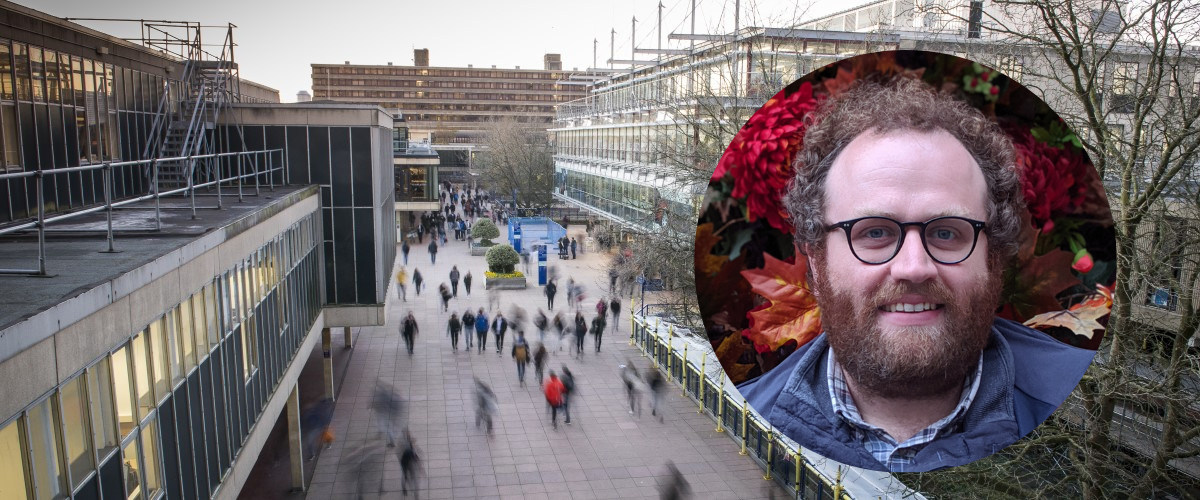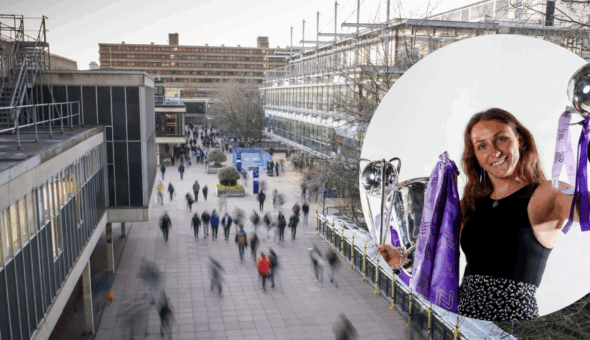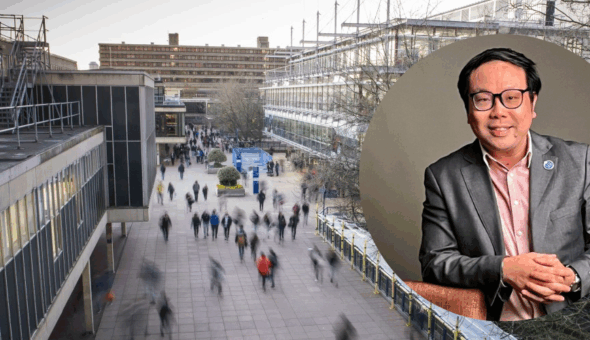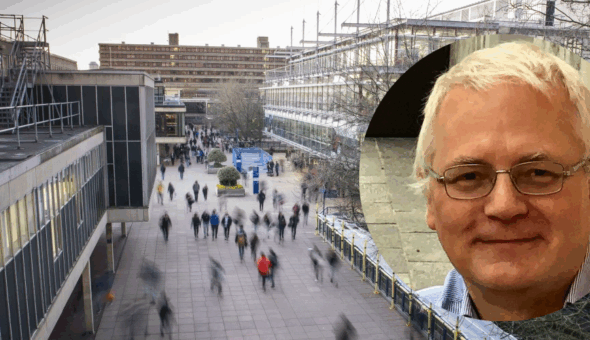Gareth Gwynn is a comedy writer, radio presenter and producer. A mathematics graduate, he’s co-written radio sitcoms like Ankle Tag and Tourist Trap, as well as writing for shows like Have I Got News For You. Gareth also co-presents the comedy history podcast I’m So Not Over It.
His love for comedy grew during his time at Bath, where he won a Student Radio Award for his show on URB. His background in numbers and instinct for punchlines prove that logic and laughter make a surprisingly good team.
Why did you choose to study at Bath?
If you grow up in South Wales, the marketing for Bath begins at a young age, as it's probably the most ambitious day trip you can sensibly do from Neath. As such, I first associated the city with Christmas shopping trips run by the PTA, where my mum would get a bus at 6am and return with stuff from shops we definitely had in Swansea.
We did a school trip to the American Museum too, which, with hindsight, was an awfully long way for a bunch of ten-year-olds to go to look at a quilt (sorry Mrs. Knight).
I vividly remember the university open day too. I already felt like I had a handle on the city but finding that there was this whole campus on the top of the hill was a genuine surprise. It was also number one in the country for mathematics, so I begrudgingly admit that probably had some sway over the decision too – maybe greater than where my mum might have once purchased a cardigan.
Can you tell us about your experience of studying here?
At the time, the University of Bath was frantically building more on-campus accommodation – but it meant that a handful of first years found themselves living in town in John Wood Court. It ended up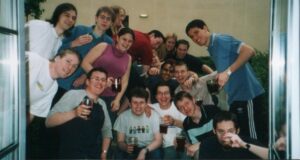 housing those who had either put Bath as their second choice or been slow to submit their accommodation form, so it was home to a heady combination of the overambitious and administratively feckless.
housing those who had either put Bath as their second choice or been slow to submit their accommodation form, so it was home to a heady combination of the overambitious and administratively feckless.
I absolutely loved it – it comprised all these buildings around a central courtyard, which seemed to foster a genuine community atmosphere. We had the city on our doorstep, too.
I could have done without the trek up the hill for the 8.15am lectures, mind.
Were you part of any societies or sports clubs during your time at Bath?
I was one of those people who ran their degree to the wire; such was my dedication to societies. A few of us set up a comedy society in our first year, but it was the student radio station, URB, which was the biggest threat to my mathematical career. My time there coincided with a great group of people, some of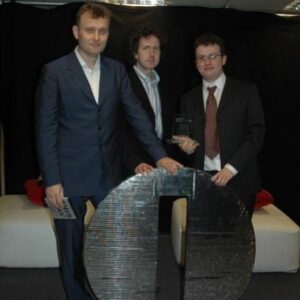 whom were also interested in making radio comedy, or engineers happy to facilitate it, and several of us have gone on to work in media and broadcasting.
whom were also interested in making radio comedy, or engineers happy to facilitate it, and several of us have gone on to work in media and broadcasting.
I won a Student Radio Award in 2004 for Best Comedy Show, which was a bit of a turning point. It legitimised all the time I’d been spending in the station, and it meant trying to do radio comedy for a living didn't feel completely fanciful.
Weirdly, the award was presented by Punt and Dennis, who I would work with as a writer on The Now Show years later.
Describe your career journey since graduating.
I worked as a financial advisor while I set about trying just about every form of comedy I could. I did a bit of stand-up; I presented shows on local radio, and I entered a BBC Talent scheme for new writers, which led to a pilot on BBC Radio 7 and some writing work on BBC Radio 4.
In 2007, I left the IFA to work for BBC Radio Wales and then XFM South Wales as a producer. After months of back-and-forth as a freelance producer in Cardiff, a comedy writer in London and a stalwart of the Leigh Delamere Services scene, in 2009 I became one of the BBC Radio Comedy department’s in-house writers. It was a one-year contract, and I got posted to whatever show needed a writer that day. It was mainly the topical shows, but I also got experience on sketch shows, sitcoms and pilots.
What is a typical day like in your current role?
It’s tricky to describe a typical day when you jump around projects to make a living, but in the last week or so I spent two days in the writers' room of Catherine Bohart’s BBC Radio 4 show Too Long; Didn’t Read.
This year, I’ve been doing work-in-progress runs of my stand-up show Cyril, including at the Camden Fringe and Edinburgh Fringe – so fiddling and fixing the script in light of those gigs is always on the to-do list. I also recorded and edited two episodes of the comedy–history podcast I’m So Not Over It, which I co-present with the comedian Esyllt Sears. It covers 1977 to the present day. I have just realised my first year in Bath (2001) is slap-bang in the middle of that period. Chilling.
What do you enjoy most about your career? Has anything surprised you?
I like the variety and collaborative aspects. I’ve co-written a couple of sitcoms, including Ankle Tag on BBC Radio 4, but while working on something like that, it’s great to be able spend a day or two writing jokes for an award ceremony or topical show to break it up. 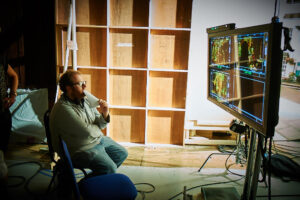
The biggest surprise has probably been how much I’ve enjoyed working on documentaries. I’ve been lucky to present and produce a few one-off features for BBC Radio 4 and BBC Radio Wales on all sorts of subjects, from Welsh independence to the careers of Harry Secombe and Rik Mayall.
It’s amazing how much you can get away with in what is meant to be a traditional documentary slot and it’s incredible who will say yes to an interview. A few years ago, I made a show about fakes and forgeries and got to spend a day with a real-life convicted fraudster, who was absolutely lovely. But then that's how they do it, isn't it?
How did your studies help you to develop?
People seem amazed that someone with a mathematics degree is working as a comedy writer, but it’s not as big a leap as you’d think. Maths frequently boils down to finding the links between two seemingly disparate things or building an argument piece by piece, and so many jokes, sketches or comedy routines do exactly that.
For a couple of years, I wrote gags for the XFM London Breakfast Show every single day. No matter what I was working on, at the end of the day I had to write 10 vaguely topical one-liners, and sitting on the bus with the Metro paper trying to find links between disparate stories felt more like fighting through one of Professor Geoff Smith’s problem sheets than anything else.
You volunteer on Bath Connection – could you tell us why you give back to Bath in this way?
When I was a student, I didn’t know anybody who worked in comedy or broadcasting, so trying to do this for a living felt like pie in the sky. I can vividly recall the handful of interactions I had with anyone who had come close to being involved in broadcast comedy – and back then, I’d have loved to speak to someone about how on earth you get going in this world, so I’m more than happy to be that person 20 years later.
What advice would you give to prospective students considering studying your course at Bath?
It’s Bath. You can’t go far wrong.
Respond
